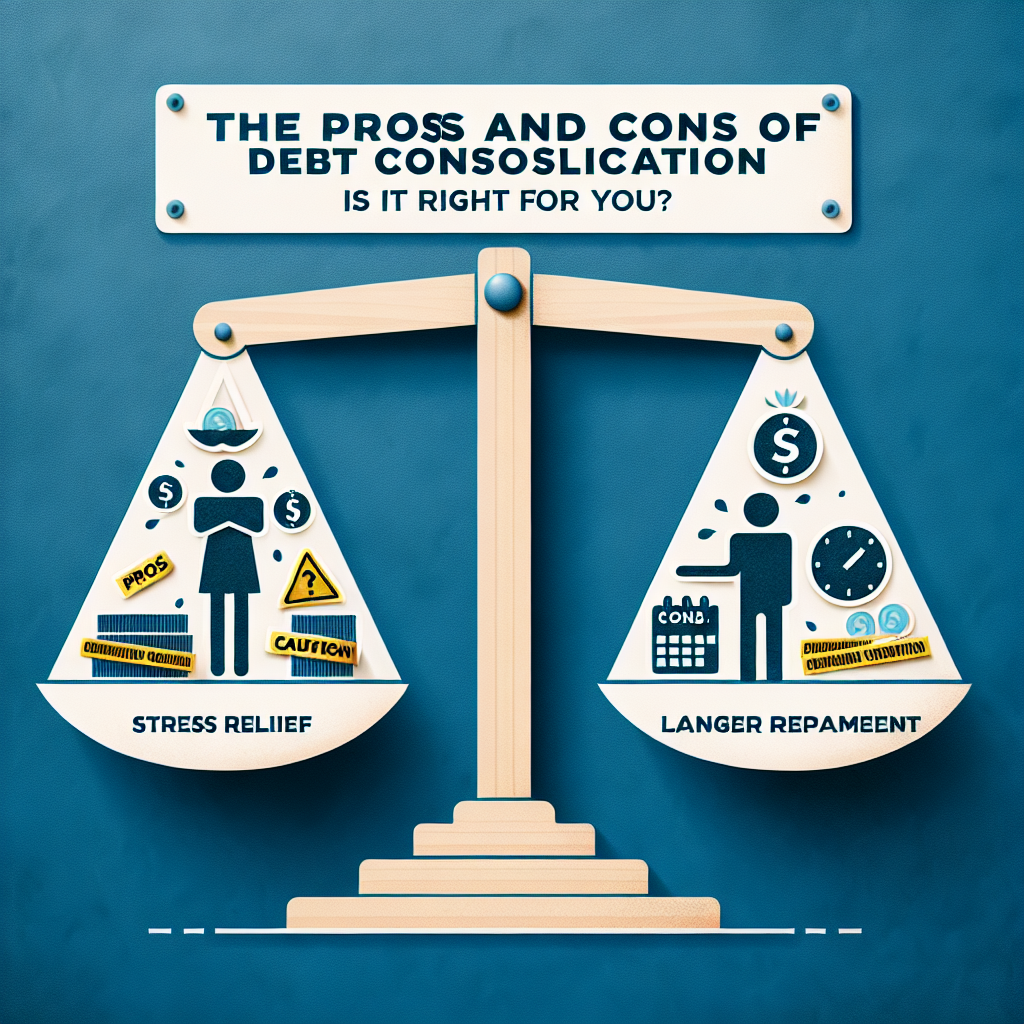Debt consolidation is a financial strategy that involves combining multiple debts into a single loan, typically with a lower interest rate. While it can provide relief for some, it’s not the best fit for everyone. In this article, we will explore the pros and cons of debt consolidation to help you determine if it’s the right choice for your financial situation.
What is Debt Consolidation?
Debt consolidation refers to the process of taking out a new loan to pay off multiple existing debts, such as credit cards, medical bills, or personal loans. This can simplify your financial management by reducing the number of creditors you deal with and potentially lowering your overall interest payments.
Types of Debt Consolidation
- Personal Loans: Unsecured loans from banks or credit unions.
- Home Equity Loans: Loans secured by your home’s equity.
- Credit Card Balance Transfers: Transferring multiple balances to a new credit card with a lower interest rate.
- Debt Management Plans: Working with a credit counseling agency to consolidate and manage debts.
The Pros of Debt Consolidation
1. Simplified Payments
One of the most significant benefits of debt consolidation is simplifying your monthly payments. Instead of juggling multiple due dates and amounts, you only need to focus on one monthly payment, which can reduce stress and improve your financial organization.
2. Lower Interest Rates
If you have high-interest debt, consolidating those debts into a loan with a lower interest rate can save you money in the long run. For example, transferring credit card debt to a personal loan with a fixed lower rate can significantly reduce your interest payments.
3. Improved Credit Score
Debt consolidation can potentially boost your credit score. By reducing your credit utilization ratio (the total amount of credit you are using compared to your total available credit), you can improve your creditworthiness. Timely payments on your consolidated loan also contribute positively to your credit history.
4. Fixed Repayment Schedule
Unlike credit cards, which often have variable interest rates, debt consolidation loans usually come with a fixed interest rate and repayment schedule. This means you will know exactly how much you owe and when it will be fully paid off, making financial planning easier.
The Cons of Debt Consolidation
1. Potential for Higher Total Costs
While consolidating debts can lower your monthly payments, extending the repayment term can often lead to paying more interest over time. It’s essential to analyze both the short-term and long-term costs before making a decision.
2. Risk of Accumulating More Debt
After consolidating, there’s a temptation to run up new charges on the paid-off credit cards. If this happens, you might end up in an even worse financial situation. It’s crucial to commit to a strict budget to prevent further debt accumulation.
3. Fees and Charges
Some debt consolidation options come with fees, such as loan origination fees or balance transfer fees. These costs can offset the benefits of lower interest rates. Be sure to read the details and understand all the fees involved.
4. Impact on Credit Score
While debt consolidation can potentially improve your credit score, applying for new loans can temporarily lower it due to a hard inquiry on your credit report. Additionally, if you miss payments on the consolidated loan, your credit score could suffer a significant hit.
Is Debt Consolidation Right for You?
Deciding whether debt consolidation is appropriate for your financial situation depends on several factors:
Assess Your Debt
Before considering debt consolidation, take a complete inventory of your debts, including interest rates, minimum payments, and total amounts owed.
Evaluate Your Financial Habits
If you have a history of accumulating debt and falling behind on payments, you may want to consider budgeting strategies and financial counseling before consolidating.
Compare Options
Research different debt consolidation options and their terms, interest rates, and fees. Look for the solution that offers the most financial benefit with the least risk.
Consult a Financial Advisor
If you are unsure, seeking help from a financial advisor can provide clarity on whether debt consolidation makes sense for your unique situation.
Conclusion
Debt consolidation can be a useful tool for managing and reducing debt, but it’s not a one-size-fits-all solution. By weighing the pros and cons of debt consolidation and considering your financial habits and goals, you can make an informed decision about whether it’s the right path for you. Remember, the key to effective debt management is not only consolidating your debt but also developing healthy financial habits for the future.

